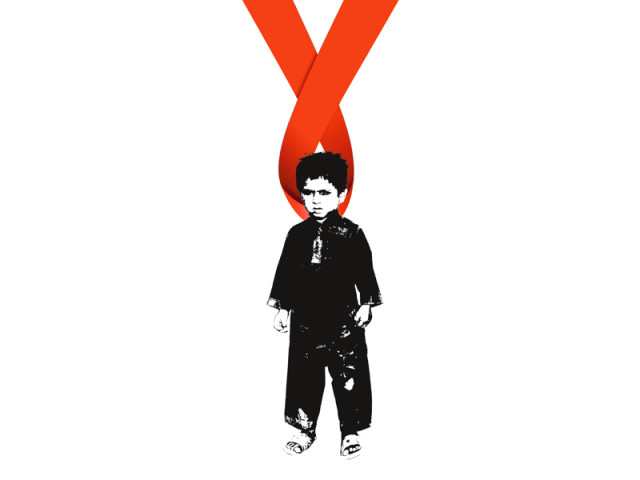Innocence lost: ‘Living with HIV is humiliating above everything else’
Many children run away from home and become victims of drug, sexual abuse.

Many children run away from home and become victims of drug, sexual abuse.
Earlier this month, a two-and-a-half year old girl from USA was reported to be ‘cured’ of HIV. She was born to a mother with HIV and the infant was treated with an aggressive antiretroviral cocktail within hours of her birth.
Researchers in France studied 14 HIV patients who received very early treatment; some of those may be ‘functionally’ cured – HIV in ‘remission’ with no need for medication. Pakistan, however, is struggling to remove associated taboos. Lack of awareness means unprotected sex is common, even with sex workers and strangers. The National AIDS Control Programme reported an estimated 97,400 HIV cases in 2010; experts say the number is only the “tip of the iceberg”.
Illiteracy about HIV/AIDS in Khyber-Pakhtunkhwa (K-P) and Federally Administered Tribal Areas (Fata) remains a major factor behind growing rates of HIV/AIDS among children.
Established in 1992, the Dost Foundation provides testing for HIV/AIDS and further counselling if a child is tested positive. The foundation runs four centres across the province, especially focusing on street children.
The Dost Foundation’s counsellor for HIV-infected children Mazhar Khan told The Express Tribune that AIDS has been one of the most threatening diseases of the 20th century. He works with HIV-positive children in Peshawar, K-P and Fata. Mazhar said most of the children they now help were found in bus stands around Peshawar. “This is where they become prone to drug addiction,” he said. Mazhar believes it is a downward spiral from there. “First they start with cigarettes and then move onto glue, then harsher drugs like hashish, medicines, alcohol and heroine,” he explained. The children then start using unsanitary needles making them prone to catching HIV/AIDS.

Monitoring and evaluation manager at the foundation, psychologist Dr Ziaul Hassan said that children during testing were also checked for drug addiction and mental illnesses. Dr Hassan explained that a child brought in to the clinic is kept under observation for 10 days. “HIV symptoms don’t show up in the first three days, but after this, anti-bodies test positive for the infection,” he said. If children are found infection-free, they are reintegrated with their families.
Counsellor Mazhar Khan said even after counselling, many families were not willing to accept their children back. In extreme cases, some even threaten to kill them. Referring to a specific case, Mazhar said that one child’s family said they would throw him in River Attock. “He has been with us for two years.” Other cases have resulted in children being shot or undergoing severe torture.

Raising awareness in the community has always been an issue. “We conduct awareness programmes across the province,” Dr Hassan said. With funding from the British Council, the foundation held 25 training sessions at universities and colleges last year. Hassan realised from the campaign that while many participants had heard about AIDS, they did not know what it was or how to prevent it. “In a country where roughly 60% of the population is illiterate, raising awareness to prevent HIV/AIDS is crucial.”

Case studies
Shahid*, 13
Shahid, a shy child from Shabqadar, left school in fifth grade. “I don’t like my family,” he said, “They send me to work in fields and often abuse me.” It affected him so much he was forced to run away from home. Shahid is the youngest of four siblings, and said his parents told him not to go to school. “I am also stigmatised for being an HIV patient,” he said. It is not easy for him to return home as many people believe the disease is transmitted only through sexual activities.
Aurangzeb*, 14
Aurangzeb*, a recently diagnosed HIV-positive child, was a former drug addict. He is from Faqirabad where he said his father is a police constable. He blames his friend for his hashish addiction. “Living with HIV is humiliating above everything else,” he said.
Published in The Express Tribune, March 17th, 2013.



















COMMENTS
Comments are moderated and generally will be posted if they are on-topic and not abusive.
For more information, please see our Comments FAQ